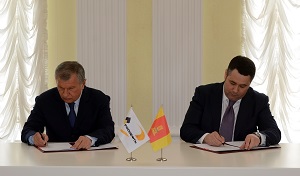Rosneft to Expand its Retail Network on Moscow-St. Petersburg Highway

Rosneft, Russian Highways and the the Government of Tver region signed a Cooperation Agreement. The Agreement was signed by the Chairman of Rosneft Management Board Igor Sechin, Chairman of the Russian Highways Board Sergei Kelbakh and Acting Governor of the Tver region Igor Rudenya.
The Agreement provides for joint development of multi-functional roadside servicing zones (MFZ) on M-11 highway (Moscow – St. Petersburg). In particular, the Agreement stipulates that Rosneft and Avtodor plan to build and operate at least 4 retail sites as part of the Tver MFZ network. The commissioning of petrol stations will be synchronized with the construction of the highway.
According to the Agreement, the Government of Tver region will provide necessary support to the project implementation in accordance with the established statutory procedure.
This project will enable Rosneft to expand its network coverage and supply quality petroleum products to the consumers on one of the most promising transport routes in Russia.
Commenting on the Agreement signed, Igor Sechin said: "Implementation of the terms of the signed document will give a significant boost to development of highways in Russia. Let me note that Rosneft became the first Russian oil company to make such an agreement.We can see great prospects for the development of this project.Cooperation with Avtodor and the Government of the Tver Region will provide the motorists with the best fuel and services of the highest world standards."
Sergey Kelbakh stated at the signing ceremony: "When creating the Russia's basic highway network, the state company Avtodor actively develops the modern format of comprehensive roadside servicing. The first multi-functional recreation zones were arranged on the M-4 Don federal highway in the Krasnodar region. These were Rosneft's MFZ that are now gladly used by those who are heading down the major highway in the south direction. It is our intention to apply the experience gained from cooperation of Rosneft and Avtodor on the M-4 highway in the new Moscow- St.Petersburg highway, starting from the orbital road built near the town of Vyshniy Volochok in the Tver region. It would be hard to overestimate the importance of the Regional Government's support to this process”.
Following the signing, Igor Rudenya stated: "Each region views the modern infrastructure as the key to the development of its entire economics. Therefore, the trilateral Agreement that we signed today with Rosneft and Avtodor is of great importance for the Tver region. The modern and multi-functional roadside servicing infrastructure will provide hundreds of jobs and offer new opportunities for tourism and small businesses. I am confident that the execution of the Agreement will give to all districts of the Tver region located along the M-11 highway momentum for development and life quality improvement."
 Also, as part of the visit to Tver region Igor Sechin and Igor Rudenya signed an agreement of cooperation between Rosneft and the Government of the region.
Also, as part of the visit to Tver region Igor Sechin and Igor Rudenya signed an agreement of cooperation between Rosneft and the Government of the region.
The document is aimed at development of investment activity in Tver region and implementation of high-tech, innovation, energy-efficient and environment-oriented technologies. Also, in accordance with the agreement, Rosneft and the Government of Tver region intend to cooperate in the area of import substitution of lubricants and special liquids at manufacturing plants and in commercial transport.
|
Note for editors: Rosneft leading positions on the key Russian highways. Thus, based on the 2014 data, the Company's market share on the federal highways М-1 Belarus, М-4 Don and М-10 Russia was 46.7%, 28.1%, and 33.5% respectively. The Company's retail business footprint covers 59 Russian regions, from Murmansk in the north to the North Caucasus in the south, and from Smolensk in the west to Sakhalin in the east. As of 31.12.2015, the Company's operating retail network included 2,557 own and leased retail sites. Rosneft has 34 retail sites and 1 oil depot in the Tver region. In May 2014, Rosneft and Avtodor signed an agreement at the St.Petersburg International Economic Forum that, among other things, provided for cooperation aimed at developing and finding new roadside infrastructure solutions. The state-run company Russian Highways (Avtodor) was established in 2009, with a view to create a basic highway network in Russia, raise off-budget investments and develop the roadside servicing facilities. Avtodor exercises fiduciary management and comprehensive upgrade of such highways as M-1 Belarus (450 km), M-4 Don (1716 km) and M-3 Ukraine (432 km). Avtodor is the general construction contractor for the Moscow-St.Petersburg highway and the Central Ring Road (CRR) of Moscow region. The new M-11 Moscow-St.Petersburg highway will go from the Moscow Ring Road to the junction with the St.Peterburg Ring Road. The total length of the highway is 669 km. Based on Autodor's work program throughout 2020, the highways under the state company's management will be provided with multi-functional roadside servicing zones (MFZ) which shall offer an extended range of services, particularly:
Besides, the roadside servicing zones may include hotel facilities. To date, Avtodor have commissioned 34 multifuction roadside servicing zones, out of wich 4 were constructed by Rosneft in the Krasnodar region. The similar servicing facilities will be constructed along the new highways M-11 and the Central Ring Road. |
Rosneft Information Division
Tel.: + 7 (499) 517-88-97
April 14, 2016
These materials contain statements about future events and expectations that are forward-looking in nature. Any statement in these materials that is not a statement of historical fact is a forward-looking statement that involves known and unknown risks, uncertainties and other factors which may cause actual results, performance or achievements expressed or implied by such forward-looking statements to differ. We assume no obligations to update the forward-looking statements contained herein to reflect actual results, changes in assumptions or changes in factors affecting these statements.